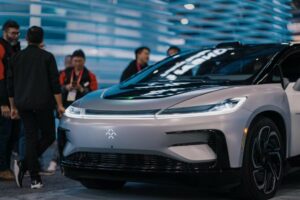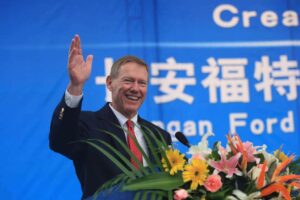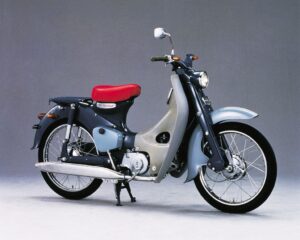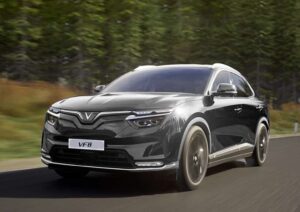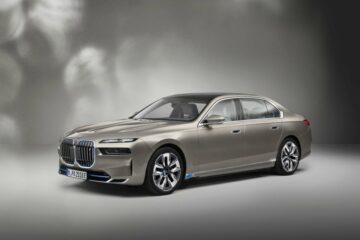Automotive suppliers say Toyota, Honda and General Motors are the best automakers to work with, and the same group is voicing concerns about significant headwinds buffeting them in 2023.
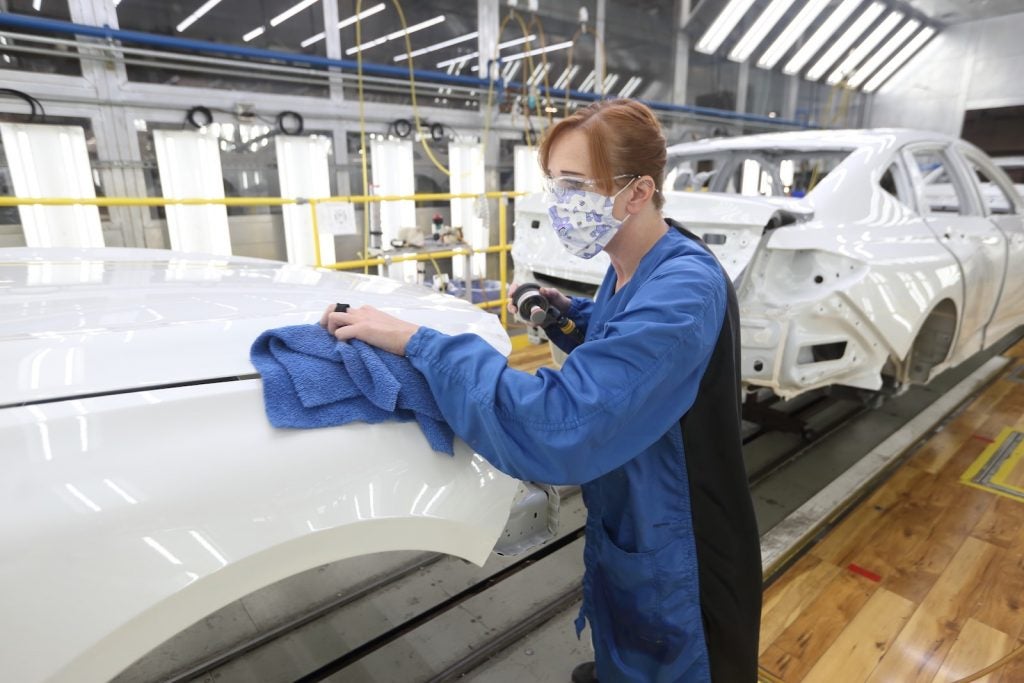
According to Plante Moran’s 23rd annual North American OEM-Supplier Working Relations Index (WRI) Study, the three companies excelled or improved in a variety of areas, with General Motors seeing its overall score jump 10 points — the second-largest this year.
Toyota and Honda remained No. 1 and No. 2, despite dropping 7 and 3 points respectively. Nissan, Ford and Stellantis round out the group. Ford remained in the top five despite a 23-point decline year-over-year. The study uses feedback from more than 450 Tier-1 suppliers to assess the state of relations between the six largest car companies and the supply chain.
GM, Nissan and Stellantis improved their overall WRI scores while Toyota, Honda and Ford fell. Stellantis showed the greatest improvement with a gain of 17 points, followed by GM’s 10-point gain and Nissan’s 6-point uptick. Nissan took over fourth place from Ford.
Big picture problems
It also examines some of the concerns the supply chain faces. This year’s study found suppliers increasingly worried about the risk related to short-term cost-recovery issues, production scheduling and supply-chain disruptions resulting from the steady shift to electric vehicles by automakers.
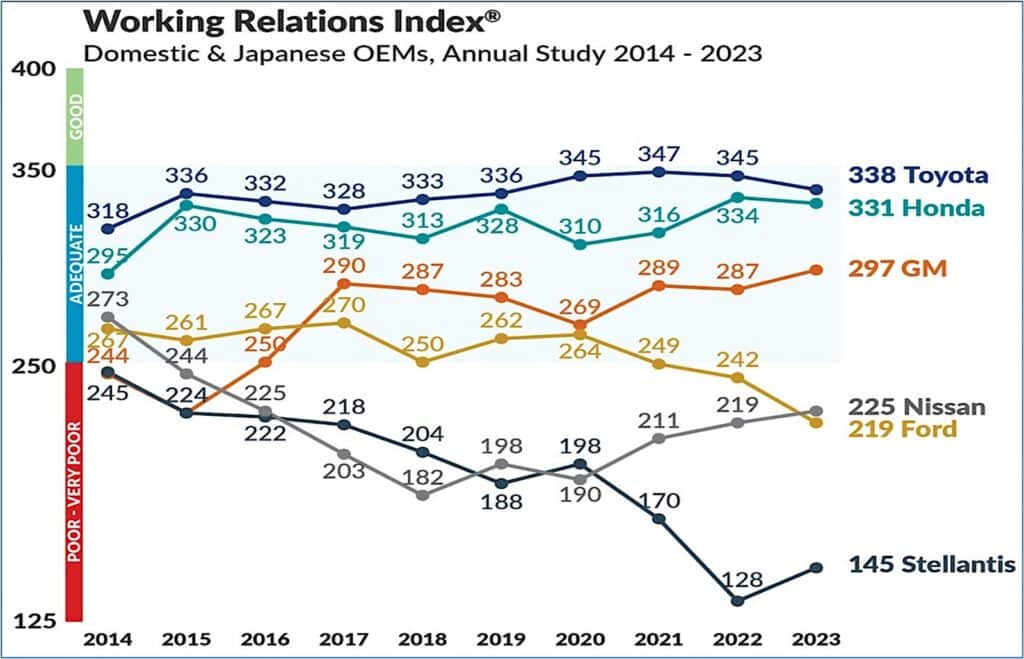
One of the largest concerns with being kept in the loop about the changes and advancements within that part of the business so they can adequately prepare for investments, capital acquisitions as well as ensuring they have the appropriate talent in place to meet the new demands.
“The industry continues to face unprecedented challenges in the shift to EVs that unless effectively addressed will only get worse,” said Dave Andrea, principal in Plante Moran’s Strategy and Automotive & Mobility Consulting Practice.
“During Covid, a ‘war room’ approach was adopted to quickly resolve critical issues. That approach is what auto manufacturers need to maintain during the transition to EV technologies. The industry needs that level of collaboration, even without the pressure of a crisis.”
What was learned
The industry’s been laboring through unchartered waters for a few years as it navigated the pandemic and the period after. It seems only now, as inventory levels begin to normalize while new vehicle prices remain high, that suppliers are feeling like they’re prepared for the volatility that can still strike the industry.
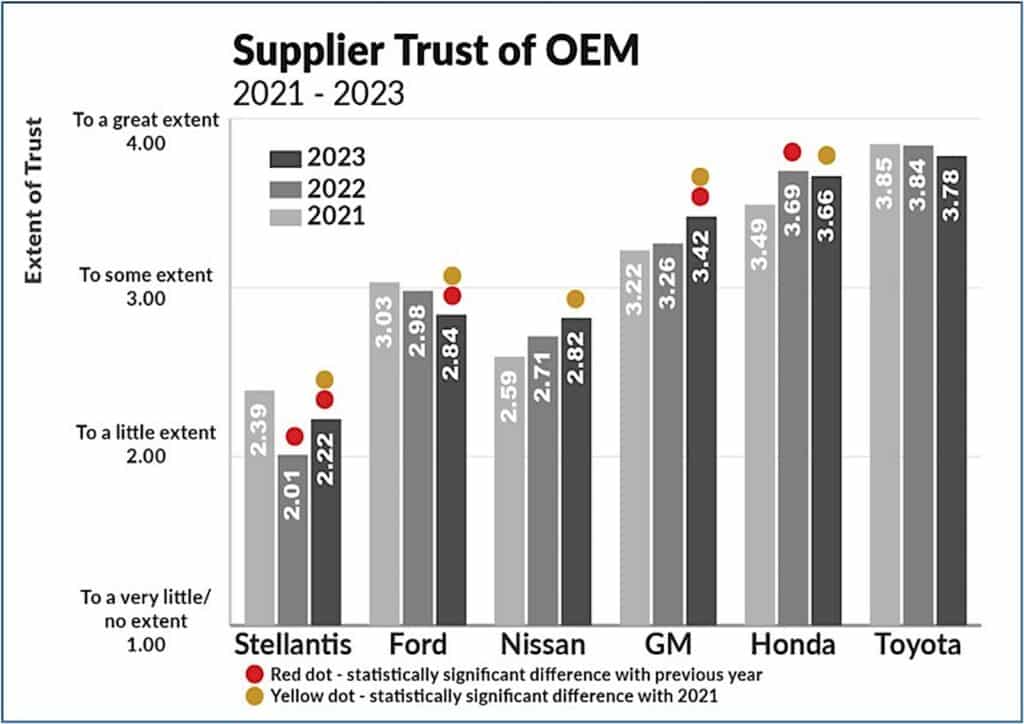
The study’s authors came away with four “takeaways,” including:
- OEMs have improved their supplier relations by incorporating the Working Relations Index findings in their personnel performance metrics, corporate strategic planning processes, and communication strategies allowing them to better leverage their suppliers.
- Strong supplier working relations are more than external relations with suppliers. An improving WRI reflects improved OEM cross-functional internal relations and indicates how well purchasing, engineering, and manufacturing are working together — a critical need to achieve faster product development.
- New market conditions, such as supply chain disruptions and new technologies that change product plans and manufacturing strategies, require short- and long-term forecasts and production schedules to be more accurate and to be communicated more timely with suppliers.
- Cost recovery mechanisms should not be judged in isolation. Inflation-driven cost increases and adjustments need to be addressed in a timely manner that is consistent, tested, and institutionalized and supported by OEM and supplier cost reduction efforts.
OEMs that effectively address these issues are generally stronger customers of choice for suppliers and rate them better on perceived trust, supplier business return on investment, and rewarding suppliers for high performance, according to Plante Moran.
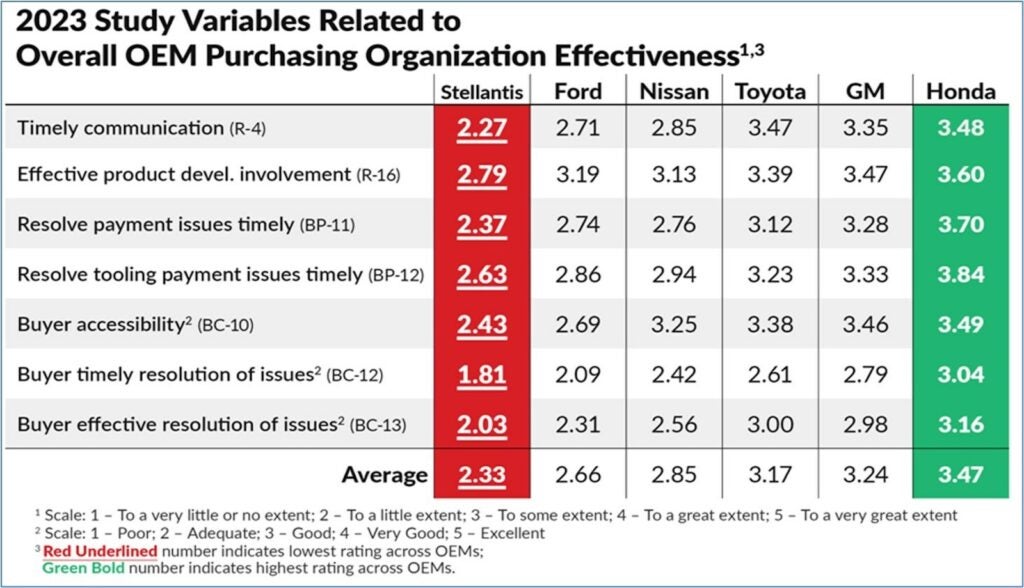
Good and bad
Each of the automakers excelled in certain areas with Honda leading in purchasing effectiveness, which involves timely communication, resolving issues, buyer accessibility and other factors, followed closely by GM.
In Overall OEM Purchasing Organization Effectiveness Honda led in all seven categories with a composite average score of 3.47. GM purchasing was second and led in 5 categories with 3.24 and surpassed Toyota which scored 3.17. Nissan was fourth with 2.85; Ford fifth with 2.66 and Stellantis last in all seven categories at 2.33.
In terms of OEM-Supplier Trust and Communication, GM, Honda and Toyota took the top three spots, but Stellantis and Nissan made “statistically significant” gains in the category. Meanwhile Ford dropped again — for the third straight year.
However, there is one category that the entire group could stand to make strides in: timely communication.
“All six of the OEMs need to improve in this important area,” said Andrea. “In the current high-risk business environment, communication is key, because the supplier CEOs must ask: who would I rather do business with? Who is my customer of choice? And the answer comes down to three questions: Who do I trust? Where will I get the best return on investment? And what is the prospect for future business? So, it’s in the OEM’s best interest to maintain open and honest communication with its suppliers.”
- SEO Powered Content & PR Distribution. Get Amplified Today.
- PlatoAiStream. Web3 Data Intelligence. Knowledge Amplified. Access Here.
- Minting the Future w Adryenn Ashley. Access Here.
- Buy and Sell Shares in PRE-IPO Companies with PREIPO®. Access Here.
- Source: https://www.thedetroitbureau.com/2023/05/toyota-honda-and-gm-best-automakers-to-work-with-suppliers-say/
- :is
- :not
- :where
- 1
- 10
- 17
- 2023
- 24
- 66
- 7
- a
- About
- accessibility
- According
- accurate
- Achieve
- acquisitions
- address
- adequately
- adjustments
- adopted
- advancements
- After
- again
- All
- Allowing
- also
- American
- an
- and
- annual
- answer
- approach
- appropriate
- ARE
- AREA
- areas
- AS
- At
- authors
- auto
- automakers
- automotive
- average
- away
- BE
- because
- been
- begin
- being
- BEST
- Better
- between
- Bureau
- business
- but
- by
- came
- CAN
- capital
- car
- categories
- Category
- CEOs
- certain
- chain
- challenges
- change
- Changes
- Chart
- choice
- closely
- collaboration
- comes
- communicated
- Communication
- Communication Strategies
- Companies
- Concerns
- conditions
- consistent
- consulting
- continues
- Corporate
- Cost
- cost reduction
- could
- Covid
- crisis
- critical
- Current
- customer
- Customers
- Dave
- Decline
- demands
- Despite
- Development
- disruptions
- do
- down
- dropped
- Dropping
- during
- effectively
- effectiveness
- efforts
- Electric
- electric vehicles
- Engineering
- ensuring
- Entire
- Environment
- Ether (ETH)
- EV
- Even
- Examines
- external
- Face
- faces
- factors
- faster
- feedback
- few
- findings
- followed
- For
- Ford
- forecasts
- found
- four
- Fourth
- from
- future
- Gain
- Gains
- General
- General Motors
- generally
- get
- GM
- greatest
- Group
- Have
- headwinds
- High
- high-risk
- How
- HTTPS
- i
- important
- improve
- improved
- improvement
- improving
- in
- Including
- incorporating
- Increases
- increasingly
- index
- indicates
- industry
- industry’s
- interest
- internal
- inventory
- investment
- Investments
- isolation
- issues
- IT
- ITS
- jpg
- judged
- jump
- kept
- Key
- largest
- Last
- leading
- Led
- Level
- levels
- Leverage
- like
- Line
- long-term
- made
- maintain
- make
- manner
- Manufacturers
- manufacturing
- Market
- market conditions
- max-width
- Meanwhile
- mechanisms
- Meet
- Metrics
- mobility
- more
- Motors
- must
- my
- Need
- needs
- New
- New technologies
- Nissan
- no
- North
- now
- of
- Ohio
- on
- ONE
- only
- open
- or
- organization
- Other
- out
- over
- overall
- pandemic
- part
- perceived
- performance
- period
- Personnel
- picture
- Place
- planning
- plans
- plato
- Plato Data Intelligence
- PlatoData
- points
- practice
- Prepare
- prepared
- pressure
- Prices
- Principal
- processes
- Product
- product development
- Production
- prospect
- purchasing
- Questions
- quickly
- Rate
- rather
- recovery
- reduction
- reflects
- related
- relations
- remain
- remained
- require
- resolving
- respectively
- resulting
- return
- rewarding
- Risk
- round
- Said
- same
- say
- scheduling
- score
- Second
- second-largest
- seeing
- seems
- seen
- seven
- shift
- short-term
- should
- showed
- significant
- SIX
- So
- some
- stand
- State
- steady
- Still
- straight
- Strategic
- strategies
- Strategy
- strides
- strike
- stronger
- Study
- such
- suppliers
- supply
- supply chain
- Supported
- surpassed
- Talent
- Technologies
- terms
- than
- that
- The
- The State
- their
- Them
- There.
- These
- they
- Third
- this
- this year
- three
- Through
- to
- together
- took
- top
- toyota
- transition
- Trust
- unprecedented
- variety
- vehicle
- Vehicles
- Volatility
- was
- Waters
- WELL
- were
- What
- What is
- which
- while
- WHO
- will
- with
- within
- without
- Work
- working
- worried
- worse
- would
- year
- years
- zephyrnet



